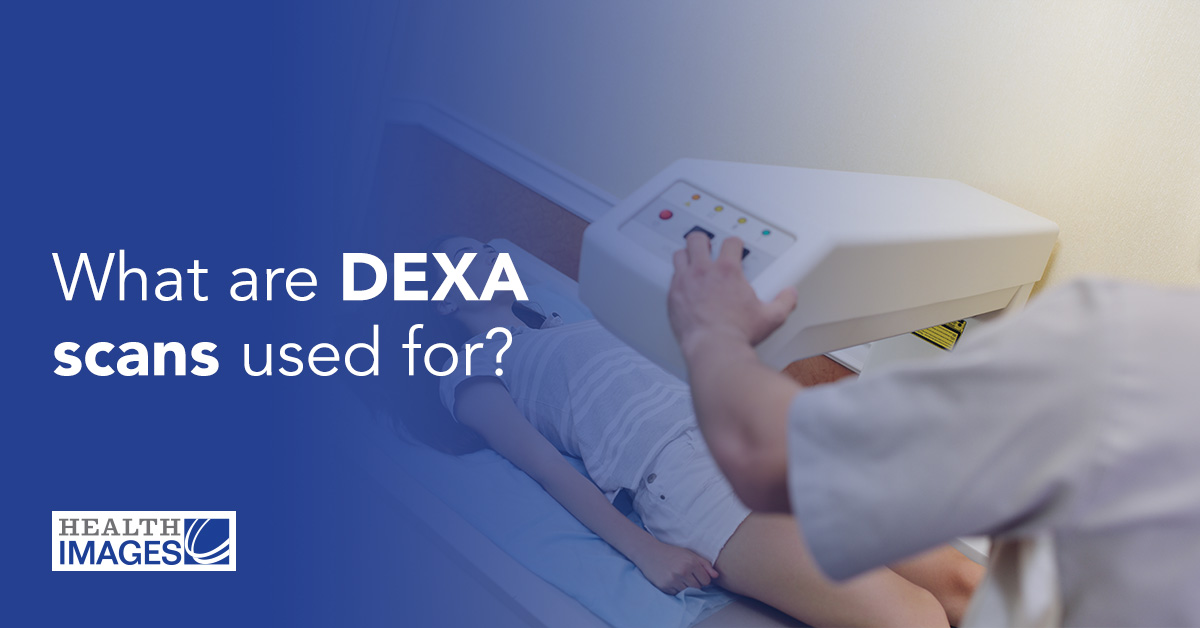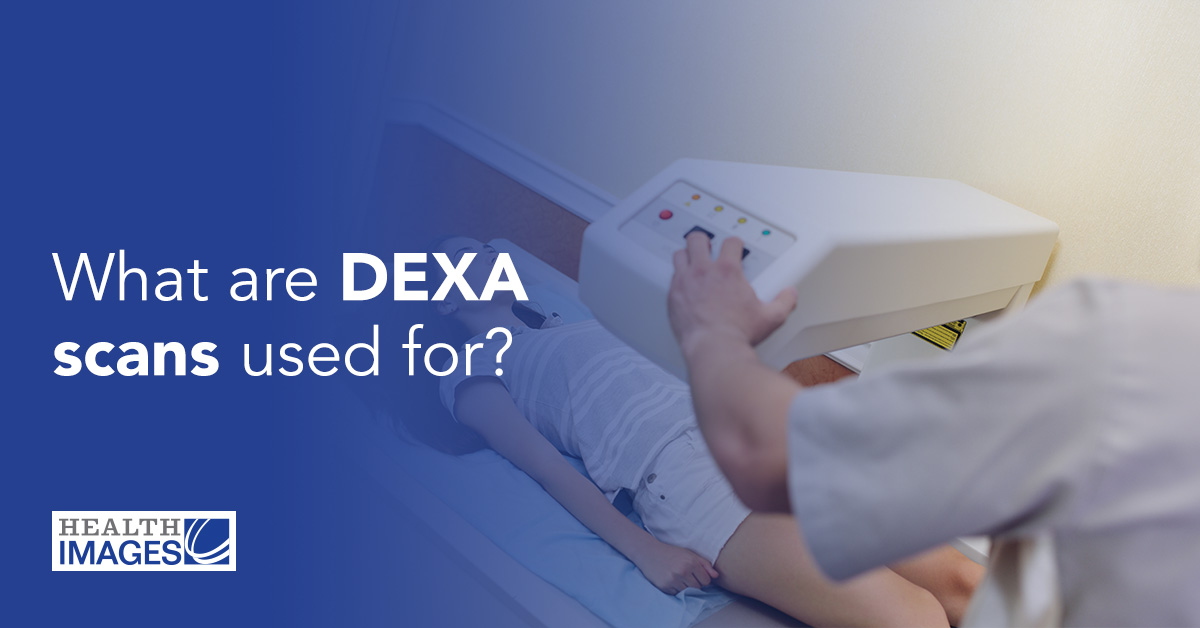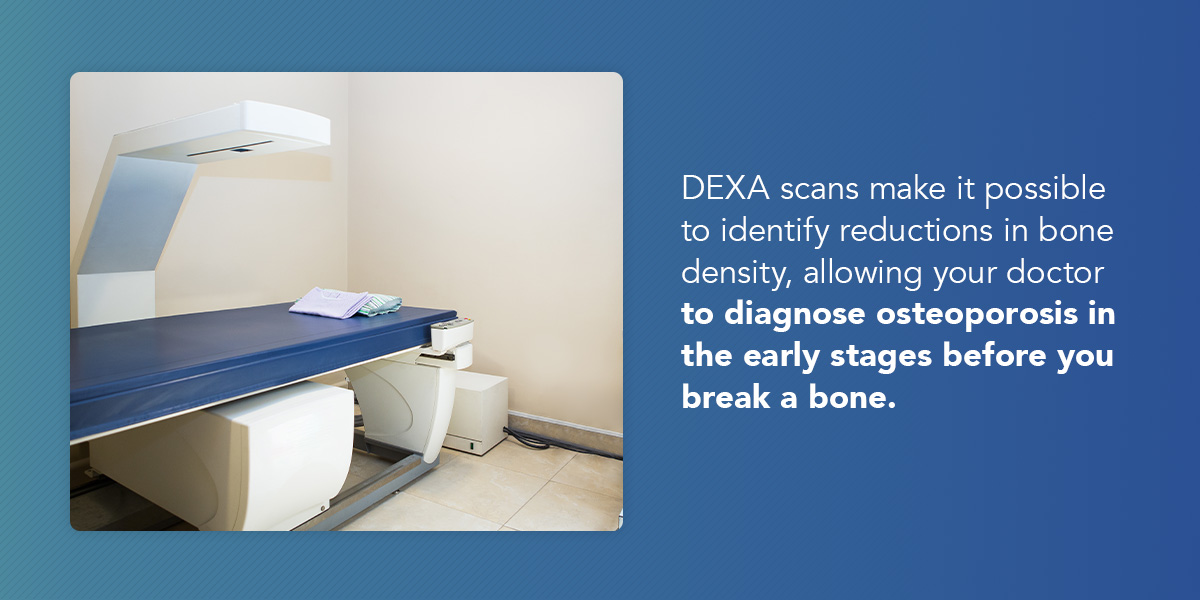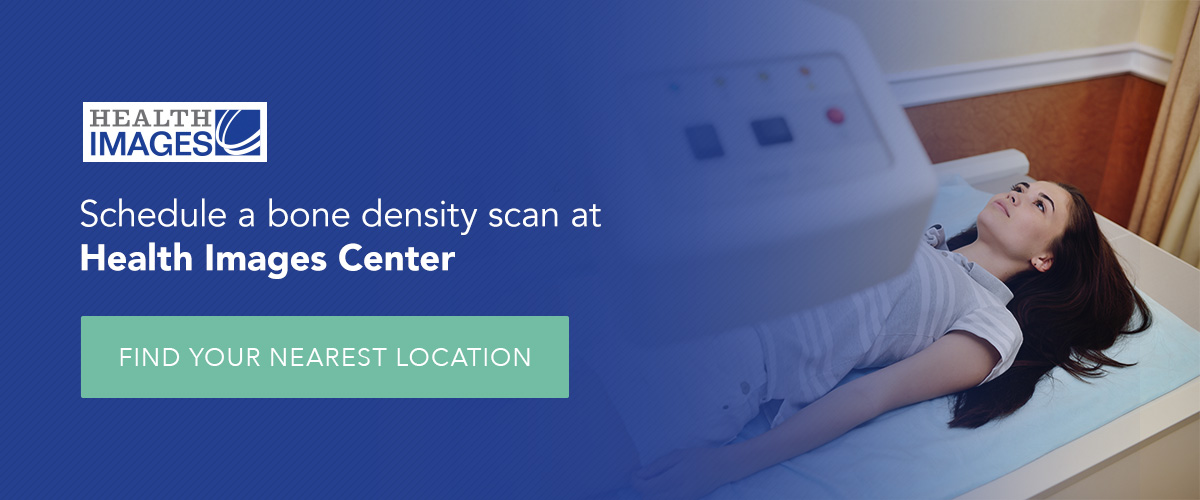What are DEXA scans used for?
Bone density scans are vital for evaluating bone health so you and your doctor can decide on treatment plans for issues like osteoporosis. A DEXA scan is a quick screening that can provide useful information about bone density, existing conditions and the likelihood of future fractures. You will not need to take special preparation steps before this scan. However, you should tell your provider and technologist if you may be pregnant or recently received a contrast material injection. If you need a DEXA scan, keep reading to learn more about the test and how it can help you.
What is a DEXA scan?
A DEXA scan measures your bones’ mineral content with low-dose x-rays. DEXA scans are safe and use much less radiation than other x-rays. These inexpensive scans are a reliable way to diagnose osteoporosis.
The painless test usually takes half an hour or less. You will not need to prepare for the exam except to avoid wearing clothes or jewelry with metal components such as belts, buckles or chains. Additionally, you cannot take calcium supplements for 24 to 48 hours before the scan.
During the scan, a dual-energy x-ray passes through your body. Your soft tissues and bones absorb some of the radiation, while the rest travels throughout your body. Detectors in the DEXA machine measure the amount of radiation passing through the bones.
The scan will begin with you lying on the x-ray table. The technologist will position your body correctly and use devices like foam blocks to help you hold the necessary positions. The machine’s arm will pass over your body, using two beams with a small amount of radiation to distinguish bones from tissue. Scans often occur over the spine and hips, but you may need to scan other locations. For example, the technologist may scan your forearm to assist in the detection of cortical bone loss associated with hyperparathyroidism if scanning your spine or hip is not possible.
The scanner will translate measurements into graphs and pictures. Fat and muscle will appear as shadows, while bone will look white on the monitor. Your radiologist or provider will review and interpret the findings, and your provider will send a written report to recommend possible treatments.
What is the value of a DEXA scan?
DEXA scans make it possible to identify reductions in bone density, allowing your doctor to diagnose osteoporosis in the early stages before you break a bone. However, there are several other reasons you may need this scan. You may receive a bone density scan recommendation if you:
- Have broken a bone after a minor injury or fall
- Need to confirm an osteoporosis diagnosis
- Have a condition that can lead to low bone density, such as arthritis
- Are a woman who drinks or smokes heavily after menopause, has a body mass index of less than 21 or has a family history of hip fractures
- Experience significant gaps of a year or more between your periods
- Removed your ovaries before age 45 and have not had hormone replacement therapy
- Have been taking a medication that can cause weakened bones, such as oral glucocorticoids, which can treat inflammation
- Need to determine bone loss rate
- Require a new treatment plan such as eating a high-calcium diet, completing weight-bearing exercise or spending time in the sun
- Need to evaluate whether treatment is working
- Have lost at least an inch and a half in height
What can a DEXA scan tell you?
DEXA scans can detect brittle or weak bones and predict the odds of a future fracture. These scans can also determine whether your bone density is worsening, improving or staying the same. Your provider can use your scan results to create a treatment plan to improve your bone strength and prevent worsening conditions.
After the exam, your provider will compare your findings with two norms — healthy young adults and age-matched adults. The difference is the standard deviation, or T-score. Positive T-scores indicate the bone is stronger than normal, while negative T-scores indicate the bone is weaker than normal. Generally, fracture risks double with each standard deviation below normal.
How often should you get a bone density test?
People over 50 with a risk of developing osteoporosis or other risk factors should schedule regular bone density scans. Additionally, those with a family history of osteoporosis, previous fracture injuries and some medications or medical disorders may be more at risk for osteoporosis.
Men over 70 and women over 65 should request bone density scans even if they have not identified risk factors. At these ages, people are more likely to experience bone loss. After menopause, estrogen plummets and then slows. Requesting a bone density scan can provide a baseline for future scans to better monitor progress or decline.
You should get a bone density test about every two years. Since bone density changes over short intervals are relatively minor, even high-risk patients do not usually need testing more often than that. However, your provider may recommend a different schedule if you have specific diseases or risk factors. You should repeat a DEXA scan if your provider expects rapid changes to your bone density or if it will influence clinical management.
Schedule a bone density scan at Health Images Center
If you think you’re at risk for osteoporosis, it’s time to schedule a bone density scan. At Health Images, we commit to delivering cutting-edge services while delivering high-quality care, compassion and convenience. We have multiple medical imaging service locations in Denver, Boulder and beyond.
We have revolutionized radiology imaging by providing efficient service and consistent results. Our team maintains cutting-edge, accurate technology so we can identify potential issues as quickly as possible. With fast results and a high patient satisfaction rating, we feel confident we can deliver the services you need to remain happy and healthy.
We proudly provide unparalleled quality, ensuring your well-being always comes first. With us, you can always expect a comfortable and pleasant experience. Our skilled staff is always ready to assist you with your diagnostic imaging needs. Find a location near you to schedule your service with our caring team.






